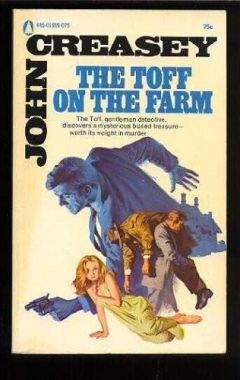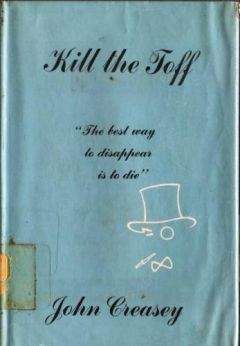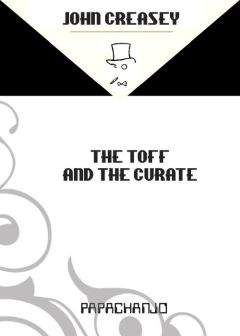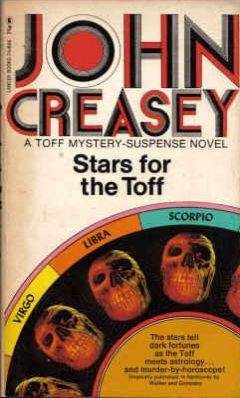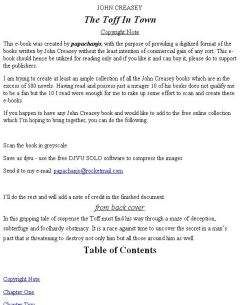John Creasey - The Toff and the Fallen Angels
На электронном книжном портале my-library.info можно читать бесплатно книги онлайн без регистрации, в том числе John Creasey - The Toff and the Fallen Angels. Жанр: Прочее издательство неизвестно, год 2004. В онлайн доступе вы получите полную версию книги с кратким содержанием для ознакомления, сможете читать аннотацию к книге (предисловие), увидеть рецензии тех, кто произведение уже прочитал и их экспертное мнение о прочитанном.
Кроме того, в библиотеке онлайн my-library.info вы найдете много новинок, которые заслуживают вашего внимания.
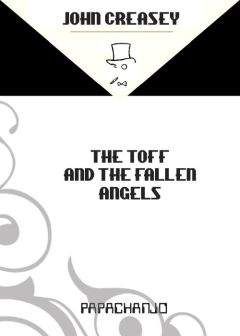
John Creasey - The Toff and the Fallen Angels краткое содержание
The Toff and the Fallen Angels читать онлайн бесплатно
The door was closed, and Rollison rang the bell. After a brief pause, Judy Lyons appeared, still very subdued. She peered out nervously, then stood aside.
“We thought you weren’t coming,” she said.
“I hope you’re glad I have,” replied Rollison.
“I’m not sure that it makes any difference,” said Judy tardy. “We’re all upstairs, in the drawing-room.”
The room was immediately above Naomi Smith’s study, but was much larger. Round the walls were couches and armchairs, other smaller chairs and tables with magazines were in the middle. In one corner stood an old radiogram, and by the side of it was a small table, at which Naomi was sitting. Rollison made a swift count of heads, and reached twenty-two. Anne Miller had not yet been taken to the police station; she sat with her long, slim legs stretched out, apparently deep in thought. The girls, all about the same age, were of all shapes and sizes, dark-haired and fair. There was one sad-faced Indian woman with the red spot on her forehead, showing that she was a Hindu of good caste, and one short, dumpy African girl with a very lively face.
Every eye was turned towards Rollison; one elfin little creature in pale green blew him a kiss.
Naomi pointed to an empty chair at her side.
“Please come and sit down, Mr. Rollison. We had just decided to wait until you came, in the hope that you could give us some encouraging news.”
“Not a hope in a thousand,” a girl said clearly.
“It’s a waste of time,” chimed in another.
Naomi’s eyes flashed, she rapped sharply on the table, calling them to attention.
“The very least you can do is show good manners!” she said icily.
Stung, Anne threw her head up, ready for argument. “But Mr. Rollison’s good manners didn’t prevent him from being three-quarters of an hour late, Mrs. Smith. Perhaps a little bird told him that we can’t be deceived any more, and that we’ve decided to leave here and make our own plans, instead of waiting to have our heads bashed in, or our babies bitten by rats. We’ve decided, too, that all these mysterious comings and goings are a waste of time, designed for the sole object of giving Mr. Rollison a sense of his own self-importance. Good manners will hardly disguise the fact that the promised miracle hasn’t come off.” There was a break in the young, scornful voice, and Rollison bit back the sharp rejoinder which rose to his lips.
“You’re all under great strain,” he said easily. “And that’s hardly surprising. The situation was bad enough when you had to come here; it’s still a cold and conven-tional world and you broke the rules. What’s happened now makes it ten times worse. Probably half of you think that some bigoted person is out to make you pay for it.” He paused long enough to look round at every face, let his gaze come to rest on Anne’s, and then went on : “I don’t think this is true. I don’t think these unfortunate people have been murdered in cold blood for the sake of a principle which is fairly loosely interpreted in this day and age. I think there is a very powerful material motive which no-one yet suspects. Whoever is behind these crimes stands to gain a great deal. I don’t, as yet, know what, and I don’t know who. I do know you can’t stand it much longer. The situation is unbearable, and I think tomorrow will see the end of it.”
Several faces lit up.
“And I think the end may come when the criminals make one final tremendous effort to force you out of here,” Rollison went on. “If you go, you’ll be playing into their hands, if you stay you may be in very grave danger indeed.”
When he stopped, no-one spoke until Naomi asked in a very quiet voice
“What do you advise, Mr. Rollison?”
“I can’t advise anything,” said Rollison. “I hope you’ll stay. If I’m right and it’s all over by tomorrow—”
“We still have our marching orders from Slatter,” Anne remarked. “We can’t win.”
“If it’s over by tomorrow,” said Rollison, quietly, “I think there’s an even chance that Sir Douglas will change his mind.”
“You mean there would have been if Anne hadn’t thrown that brick,” said the African girl, simply, and without bitterness. “You can’t seriously believe that Sir Douglas would relent after that.”
“I seriously believe it,” Rollison assured her.
“I think we all ought to make preparations to leave,” Anne said. “I—” She broke off as a bell rang sharp and dear, and suddenly her expression changed. Something like near-despair touched her. “I have to anyhow. That will be the police. This is arrest by appointment,” she went on. “They said they would come for me at half-past nine.”
Judy was staring at her helplessly.
“I have to go, too,” said Rollison. “I’ll come down with you.” Anne stood up, so tall and slim and strangely lonely and forlorn. “And I’m absolutely serious,” he said to the others. “I think tomorrow may be the last day.”
No-one spoke as he went out. Naomi jumped up, but he waved her back to her chair, and opened the door for Anne. There was a knock and a ring. He went ahead and opened the door cautiously, but this was no trick; there were three police officers in the porch, and the one in the middle was Adams.
“Miss Anne Miller?” he asked formally.
“Anne,” said Rollison, “if you need help, you have only to ask me.”
He heard Naomi hurrying down the stairs, obviously to offer what comfort she could. He nodded to the policemen and left the house.
There was no way of being sure the girls would stay on, but he believed they would. And if they did, and he was right in his supposition that tomorrow would see the whole hideous affair cleared up, then tomorrow would hold for them their greatest danger yet.
And he would have brought it upon them . . .
Two policemen watched him go.
Two policemen, obviously by coincidence, were standing outside Aldgate East Underground Station when he pulled up some distance away, and they were looking about them as if idly, but with particular interest at Gwendoline Fell, who stood by the side of her motor-scooter which was parked right outside the station. She looked questioningly at the policemen, then glanced round in Rollison’s direction. Her eyes lit up. The policemen, too, glanced at Rollison as Gwendoline went hurrying towards him, eager now as if to a lover. Rollison took both her hands.
“I was half afraid you wouldn’t get here,” she said, gripping tightly. “Are you all right?” She searched his face. “Don’t look so innocent!” she cried. “You were nearly blown-up, weren’t you?”
“That story’s got around, has it?” Rollison said, and laughed. “Yes, I survived. I’m afraid the car I’m now using isn’t big enough to put your motor-scooter in the boot.”
“I’ll leave it here,” she said, and they turned and walked back to Jolly’s battered Austin. She appeared not to notice its age and condition. “You’re going to get a front page headline in The Globe, and probably in other papers, too.”
“I don’t deserve it,” Rollison said. “Will it also be connected with Slatter?”
“Yes.”
“I hope to heaven I’ve done the right thing.”
“Let me be the judge of that,” said Gwendoline primly. “Off the record.”
He told her what he expected and had asked, and added as he drove along Commercial Road:
“The police are already watching Smith Hall in strength, but they will probably be recognised, and I want some strong-arm men who won’t be. Have you ever heard of the Blue Dog?”
“In Wapping? Or is it Whitechapel?”
“Whitechapel,” Rollison said. “So you’ve heard of it.” He turned two corners, and on the next was a public house, the woodwork painted bright blue, and the inn-sign yellow with a blue-painted mongrel. Several people went in and two came out as they passed. Rollison turned this corner, and on the left was a big wooden building, over the front of which ran the legend: Ebbutt’s Gym. Some elderly men and a few youths stood about, the youths sparring. Rollison pulled up near the entrance, and a man called :
“Lumme ! It’s Mr. Ar!”
“Where’s Bill?” called Rollison.
“In the pub, Mr. Ar!”
Rollison was giving Gwendoline Fell a hand.
“Ask him if he can spare me a few minutes here,” said Rollison.
“Sure will, Mr. Ar!” The man, small and with a nutcracker face, hurried towards the back of the Blue Dog. The youths stopped sparring, and stared with great interest at the Toff and his companion. The door of the gymnasium was open and the sound of leather on leather came clearly. Rollison pushed aside a canvas flap, remarking for all to hear :
“I’m bringing in a lady.”
“S’okay,” said another, smaller man in a white polo-necked sweater. “Always welcome, Mr. Ar, with or without!” He beamed welcome at Gwendoline with a grin stretching from cauliflower ear to cauliflower ear.
The gymnasium was much bigger than it looked from outside. There were two boxing rings, both occupied by youngsters, half-a-dozen men gathered around each. The walls were fitted with parallel bars, there were vaulting horses and punch balls, everything, in fact, needed for training in a modern gymnasium. Over in one corner was a small office, partitioned off. In another was a door marked “Showers’. The doorkeeper hovered near as Rollison explained.
“Bill Ebbutt, who owns this and runs the pub next door, used to be a heavyweight,” Rollison began.
“And a bloody good un, too,” interpolated the doorman. “And he trains promising youngsters for nothing or next-to-nothing,” said Rollison.
“Picks the good uns, too,” whispered the doorman. “And a lot of old professionals come in and help with the training. It’s really a kind of club.”
“And a good un, too,” repeated the doorman. Then his voice rose : “Here’s Bill,” he announced with obvious pride, and waved a hand in greeting as Bill Ebbutt came in.
Ebbutt was huge, bald-headed, treble-chinned and wheezy of breath. He wore an enormous polo-necked sweater of a heather-mixture wool; knitting it must have been a year’s labour of love. So big was his jowl and so comparatively small his head that he looked rather like one pear reared upon another. His eyes, deeply buried, were a bright, periwinkle blue.
“Cor lumme, Mr. Ar, you’re a sight for sore eyes.” He engulfed Rollison’s hand. “Glad to see you, always will be, who’s your lady friend?” He towered above Gwendoline, who looked up at him with barely-concealed amazement.
“Miss Gwendoline Fell,” said Rollison.
“Glad to meetcha, Miss Fell, any friend of Mr. Rollison’s—” he extended a vast hand, but before he took Gwendoline’s a change came over his expression, and almost in a whisper, he said: Not the bitch who writes in The Globe?” He raised both hands in an onslaught of horror. “I never ought to ‘ave said that, I’m sorry, I . . .”
“Very well put, Mr. Ebbutt,” said Gwendoline calmly. “That’s what at least half a million readers think of me.” She beamed up at him. “I don’t mind what I say about them, so why should I mind what they say about me?”
“I daresay,” said Bill, still abashed. “All the same, I never ought to say things like that to a guest. Here ! Not come to do a story about me and my boys, have you? I dunno that I want—”
“I just wanted her to know I’m not the nincompoop I sometimes look,” said Rollison. “Can we go into the office?” They crowded in, while sparring and the vaulting, the punching and the jumping continued. “Bill,” went on Rollison, “I need about two dozen of your boys for a job which could be very nasty.” He explained, wasting no words, obviously confident that Bill Ebbutt did not need telling anything twice.
“I get the picture,” Ebbutt said. “If anyone does lay on a kind of all-out attack, you don’t want to be caught napping. What do you really want, Mr. Ar? One man for one girl? Only way to make sure they get absolute protection.”
“If you can manage to find twenty-two—”
“Cor, bless you, there’s so much short time and re-dundancy I could do fifty! Get ‘em over there asking for jobs, no one will be surprised. O.K., Mr. Ar, you leave it to me. The flipping coppers—beg your pardon, Miss—are the first line of attack, we stand by to pick up the pieces. I’ll go over and spy out the land after the pub’s closed. Now, how about coming across to the Blue Dog for a couple, Mr. Ar? And you, Miss—it’ll be a kindness, to prove you’ve no hard feelings.”
“Roily,” said Gwendoline Fell, some time later, “I like your friends very much, and they certainly like you. Perhaps I was a little hasty when I first talked to you. I think I’ve reformed.”
“I don’t mind you reforming, providing you don’t blame me for it,” said Rollison. “I can’t wait to read your column in the morning.”
“If you care to come to Fleet Street, you could see some early editions now,” said Gwendoline.
“Nothing I’d like more,” said Rollison. “But I’ve an appointment I mustn’t miss. Show an unnatural restraint, Gwendoline—and don’t follow me.”
As far as he could judge he was not followed by her or by anyone else on his way to break into Sir Douglas Slatter’s house. He called Jolly from a call box and made sure Angela hadn’t telephoned; so she had Guy Slatter out somewhere in the West End.
And the big house should be empty, although the police were nearby.
CHAPTER 18
Burglary
ROLLISON drove past both houses. There were two police cars, and policemen were to be seen patrolling the grounds. The front porch of Number 29 was brightly lit and there was a light on in an upstairs room. Rollison parked not far from the spot where he had left his car that afternoon, and walked by a roundabout route across Bloomdale Square towards the back of the house. There were bright lights at Smith Hall, in spite of the fact that it was midnight, but only one light glowed at the back of Slatter’s house, and he judged it to be on a landing.
The police were not watching Slatter’s; their fears were for the residents of Smith Hall.
Rollison went to the back door of Number 29, and tried the handle; the door yielded, so Angela had done her job.
An inside door was open and a dim light showed. He slipped inside, closed the outer door and entered a large kitchen which led to the passage alongside the stairs. Landing and hall lights were fully on. He opened the doors of the main downstairs rooms, satisfied himself that they were empty, then went upstairs. All landing lights were on, but the house was absolutely silent. He went into the first bedroom he came to. Obviously occupied, a man’s clothes were everywhere, on the bed and on the floor; the door of a bathroom, leading off, was open and water dripped from a shower.
Rollison opened cupboards and drawers until he came to one which was locked. He forced this, without difficulty. His eye lighted on a bundle of letters addressed to Guy Slatter.
Love letters?
He opened two, and each was on the same theme. Both of them were from dead Winifred de Vaux, stating simply that Guy was the father of her child. They went further, and stated with some bitterness that this had happened before to other, many other, unfortunate girls, all of whose illegitimate children Guy had fathered.
Похожие книги на "The Toff and the Fallen Angels", John Creasey
John Creasey читать все книги автора по порядку
John Creasey - все книги автора в одном месте читать по порядку полные версии на сайте онлайн библиотеки My-Library.Info.
